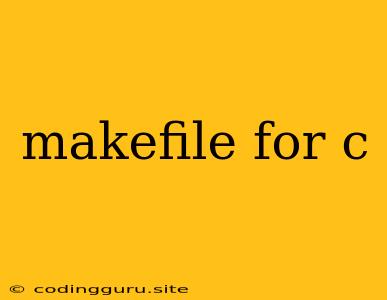Makefiles: The Powerhouse for C Projects
Have you ever found yourself manually typing commands to compile your C projects? Or perhaps you've struggled with keeping track of the dependencies and order of compilation for a large project? This is where makefiles come in!
Makefiles are a powerful tool for automating the build process of your C projects, especially when they become complex. They provide a structured way to define the relationships between files and how to compile and link them into an executable.
Here's a breakdown of why you should consider using Makefiles:
- Efficiency: Say goodbye to tedious manual commands! Makefiles streamline the build process, reducing the effort needed to compile and link your code.
- Consistency: Ensure a consistent build process every time. No more worrying about forgetting a step or compiling in the wrong order.
- Modularity: With Makefiles, you can break down your project into smaller, manageable modules, each with its own set of rules.
- Flexibility: Adapt easily to changes in your code or project structure. Makefiles offer a flexible way to customize your build process.
Understanding the Basics of Makefiles
A makefile is a text file containing instructions for the make command. It uses a simple syntax to define targets, dependencies, and build rules.
Here's a basic example of a Makefile:
# Define a target called all
all: main.o utils.o
gcc main.o utils.o -o myprogram
# Define a target for compiling main.c
main.o: main.c
gcc -c main.c
# Define a target for compiling utils.c
utils.o: utils.c
gcc -c utils.c
This Makefile defines three targets: all, main.o, and utils.o.
allis the default target. When you runmakewithout specifying a target, it will build thealltarget.main.oandutils.oare object files, which are the compiled versions of your source code.
The : symbol separates the target name from its dependencies. The dependencies are the files needed to build the target.
The rules are defined after the dependencies:
- The
gcccommand is used to compile the source files into object files. -cflag tellsgccto compile without linking.-oflag specifies the output filename.
Essential Makefile Commands
1. make: The most common command. This will build the default target, usually all.
2. make target: Builds the specified target. For example, make main.o would only compile main.c.
3. make clean: Cleans up intermediate files (object files, etc.) generated by the build process. This target is typically defined in the Makefile:
clean:
rm -f *.o myprogram
4. make help: Some Makefiles provide a help target that displays a list of available targets and their descriptions.
Advanced Makefile Features
1. Variables: Makefiles support variables, making them more flexible and easier to maintain.
CC = gcc
CFLAGS = -Wall -g
LDFLAGS = -lm
all: main.o utils.o
$(CC) $(LDFLAGS) main.o utils.o -o myprogram
main.o: main.c
$(CC) $(CFLAGS) -c main.c
utils.o: utils.c
$(CC) $(CFLAGS) -c utils.c
This example defines variables CC, CFLAGS, and LDFLAGS for the compiler, compilation flags, and linker flags, respectively. These variables can be reused throughout the Makefile.
2. Phony Targets: Sometimes you need targets that don't correspond to actual files. For example, clean is a phony target. These targets are declared with a .PHONY directive.
.PHONY: all clean
3. Pattern Rules: Makefiles provide pattern rules to handle multiple files of the same type. This simplifies your Makefile by avoiding the need to define a rule for each individual file.
%.o: %.c
$(CC) $(CFLAGS) -c $< -o $@
This pattern rule defines a rule for compiling any *.c file into a corresponding *.o file. ${content}lt; represents the dependency, and $@ represents the target.
4. Conditional Statements: Makefiles can also use conditional statements to execute different commands based on specific conditions.
ifeq ($(DEBUG), 1)
CFLAGS = -Wall -g -DDEBUG
else
CFLAGS = -Wall -O2
endif
all: main.o utils.o
$(CC) $(LDFLAGS) main.o utils.o -o myprogram
main.o: main.c
$(CC) $(CFLAGS) -c main.c
utils.o: utils.c
$(CC) $(CFLAGS) -c utils.c
This example checks the DEBUG variable. If it's set to 1, it will use debug flags. Otherwise, it will use optimization flags.
Tips for Writing Efficient Makefiles
- Keep it simple: Start with a basic Makefile and gradually add features as needed.
- Use meaningful names: Make your targets and variables easy to understand.
- Document your Makefile: Add comments to explain the purpose of each rule and variable.
- Test frequently: Run
makeoften to catch errors early on. - Utilize pattern rules: Automate the build process for multiple files using pattern rules.
- Consider using a Makefile generator: Some tools like GNU Autotools can help automate the process of generating Makefiles for complex projects.
Conclusion
Makefiles are a powerful tool for C programmers. They offer a structured and efficient way to manage your build process, making your projects more manageable and robust. By understanding the basics of Makefiles, you can significantly improve your productivity and development workflow. Don't underestimate the power of Makefiles! They can save you time, effort, and potential headaches in the long run.
